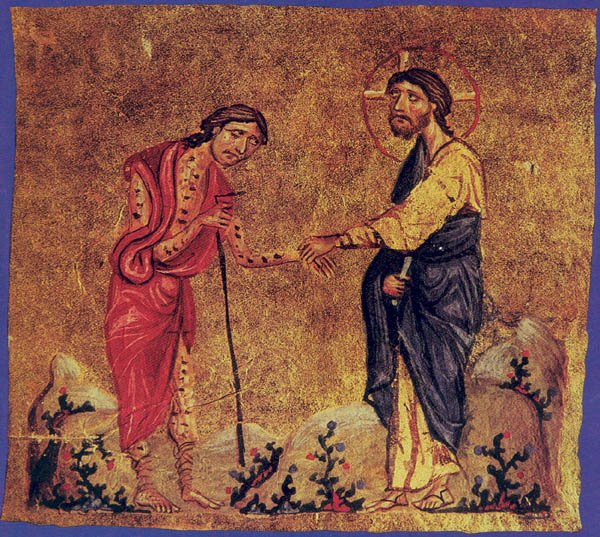The Sixth Sunday in Ordinary Time (Year B)
A leper came to Jesus and kneeling down begged him and said,
“If you wish, you can make me clean.”
Moved with pity, he stretched out his hand,
touched him, and said to him,
“I do will it. Be made clean.”
—Mark 1:40-41
During Ordinary Time, the First Reading and the Gospel proclaimed at Mass form a unit of readings with one serving to enrich our understanding of the other. Sometimes, the connection isn’t especially obvious (a good example might be last Sunday’s selection from Job being paired with the “raising up” of Simon’s mother-in-law). This Sunday, however, the connection between these two readings is not only clear, the First Reading from Leviticus actually provides the cultural and religious context that essential in understanding the story we hear from Mark’s Gospel.
The Book of Leviticus can be understood as a collection of laws touching on nearly every aspect of life that is grounded in an effort to maintain Jewish cultural and religious values. As biblical scholar J. Edward Owens, O.Ss.T., observes, Leviticus helped do this through “its preservation of liturgical, social, and other prescriptions that acknowledge God’s holiness and seek to inculcate such holiness in the people” (from Leviticus). In part, Leviticus does this by setting the boundaries of what it means to be “clean” and “unclean.” This is important because what is at stake here is not just what it means to be holy and righteous before God, but it also speaks about the quality of our relationships with our families and communities.
Chapter 13 of Leviticus (from which this Sunday’s First Reading is taken) is completely devoted to diseases of the skin, none of which can be associated directly with leprosy (Hansen’s Disease). According to Leviticus, skin diseases and certain other blemishes (such as scars and burns) render persons unclean. The primary concern was the question of contagion and the health of the community, and we should notice that there is no association between having a skin disease and being a sinner. Because of their condition, however, a sick person was ostracized from the community. As Owens observes, “On the one hand, no one wanted to contract the disease by proximity or touching. On the other hand, drawing the afflicted person back into the community was a value. Probably victims of skin disease were more pitied than judged.” As a result of all this, lepers and those with other disease of the skin became outsiders, surviving at the furthest margins of the community.
This sense of being marginalized should inform our reading of this Sunday’s Gospel and the story of Jesus healing a leper.
“This gospel offers encouragement to those who suffer illness or disability, so that they may reach out in prayer to Jesus and to the believing community, to ask not only for compassion but also for incorporation of them and their gifts into the community of faith. Likewise, it reminds those who are well not to avoid or relegate to the sidelines those who are ill or who have disabilities but to stretch out their hands to them, recognizing the gifts that they bring for spreading the gospel.”
-Barbara Reid, OP, Abiding Word: Year B
As we consider the movements of this story, we must first recognize that the sick man showed tremendous courage in approaching Jesus. Remember, by law he was expected to maintain a specified distance from those who were judged to be clean or healthy. But we must remember that there is more at stake in this passage than physical health and healing. This Gospel passage certainly speaks to Jesus’ power to heal, but the deeper meaning that Mark is trying to communicate is that Jesus has the power to restore relationships as he invites everyone—the rich and poor, the healthy and the sick, the sinner and the saint—into the Kingdom.
When he hears the sick man’s request, “If you wish, you can make me clean,” Jesus has a deep emotional response. The verb used here is splanchnizomai, which literally means to be moved in “the intestines.” To say it another way, Jesus has a “gut reaction” to the man’s appeal. Instead of turning away from the man, Jesus reaches out to him, touches him, and heals him: “I do will it. Be made clean.”
Through is encounter with Jesus, the man is not only restored to health, but he is, in a sense, brought back to life by being able to return to the life of the community and to the practice of his ancestral faith. The end of our passage tells that the man publicly professed what God had done for him through Jesus. This is certainly an invitation for us to reflect on how we express our gratitude for the healing, wholeness, and mercy that the Lord offers to us.
O God, who teach us that you abide
in hearts that are just and true,
grant that we may be so fashioned by your grace
as to become a dwelling pleasing to you.
Through our Lord Jesus Christ, your Son,
who lives and reigns with you in the unity of the Holy Spirit,
God, for ever and ever. Amen.
-Collect for the Sixth Sunday in Ordinary Time
